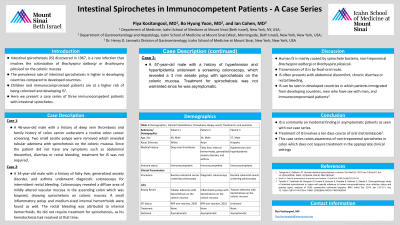Tuesday Poster Session
Category: Colon
P3081 - Intestinal Spirochetes in Immunocompetent Patients
Tuesday, October 24, 2023
10:30 AM - 4:00 PM PT
Location: Exhibit Hall

Has Audio

Piya Kositangool, MD
Icahn School of Medicine at Mount Sinai (Beth Israel)
New York, NY
Presenting Author(s)
Piya Kositangool, MD1, Bo Hyung Yoon, MD2, Ian Cohen, MD2
1Icahn School of Medicine at Mount Sinai (Beth Israel), New York, NY; 2Icahn School of Medicine at Mount Sinai, New York, NY
Introduction: Intestinal spirochetosis (IS), discovered in 1967, is a rare infection that involves the colonization of Brachyspira aalborgi or Brachyspira pilosicoli on the colonic mucosa. The prevalence rate of intestinal spirochetosis is higher in developing countries compared to developed countries. Children and immunocompromised patients are at a higher risk of being colonized and developing IS. Here we present a case series of three immunocompetent patients with intestinal spirochetes.
Case Description/Methods: Case 1: A 46-year-old male with a history of deep vein thrombosis and family history of colon cancer underwent a routine colon cancer screening. Two small sessile polyps were removed which revealed tubular adenoma with spirochetosis on the colonic mucosa. Since the patient did not have any symptoms such as abdominal discomfort, diarrhea or rectal bleeding, treatment for IS was not required.
Case 2: A 34-year-old male with a history of fatty liver, generalized anxiety disorder, and asthma underwent diagnostic colonoscopy for intermittent rectal bleeding. Colonoscopy revealed a diffuse area of mildly altered vascular mucosa in the ascending colon which was biopsied, showing spirochetosis on colonic mucosa. A small inflammatory polyp and medium-sized internal hemorrhoids were found as well. The rectal bleeding was attributed to internal hemorrhoids. He did not require treatment for spirochetosis, as his hematochezia had resolved at that time.
Case 3: A 57-year-old male with a history of hypertension and hyperlipidemia underwent a screening colonoscopy, which revealed a 3 mm sessile polyp with spirochetosis on the colonic mucosa. Treatment for spirochetosis was not warranted since he was asymptomatic.
Discussion: Human (IS) is mainly caused by spirochete bacteria, non-treponemal Brachyspira aalborgi or Brachyspira pilosicoli. Transmission of IS is by fecal-oral route. IS can be seen in developed countries in which patients immigrated from developing countries, men who have sex with men, and immunocompromised patients. IS often presents with abdominal discomfort, chronic diarrhea or rectal bleeding. However, IS is commonly an incidental finding in asymptomatic patients as seen with our case series. Treatment of IS involves a ten days course of oral metronidazole. This case series raises awareness of non-treponemal spirochetes in colon which does not require treatment in the appropriate clinical settings.
Disclosures:
Piya Kositangool, MD1, Bo Hyung Yoon, MD2, Ian Cohen, MD2. P3081 - Intestinal Spirochetes in Immunocompetent Patients, ACG 2023 Annual Scientific Meeting Abstracts. Vancouver, BC, Canada: American College of Gastroenterology.
1Icahn School of Medicine at Mount Sinai (Beth Israel), New York, NY; 2Icahn School of Medicine at Mount Sinai, New York, NY
Introduction: Intestinal spirochetosis (IS), discovered in 1967, is a rare infection that involves the colonization of Brachyspira aalborgi or Brachyspira pilosicoli on the colonic mucosa. The prevalence rate of intestinal spirochetosis is higher in developing countries compared to developed countries. Children and immunocompromised patients are at a higher risk of being colonized and developing IS. Here we present a case series of three immunocompetent patients with intestinal spirochetes.
Case Description/Methods: Case 1: A 46-year-old male with a history of deep vein thrombosis and family history of colon cancer underwent a routine colon cancer screening. Two small sessile polyps were removed which revealed tubular adenoma with spirochetosis on the colonic mucosa. Since the patient did not have any symptoms such as abdominal discomfort, diarrhea or rectal bleeding, treatment for IS was not required.
Case 2: A 34-year-old male with a history of fatty liver, generalized anxiety disorder, and asthma underwent diagnostic colonoscopy for intermittent rectal bleeding. Colonoscopy revealed a diffuse area of mildly altered vascular mucosa in the ascending colon which was biopsied, showing spirochetosis on colonic mucosa. A small inflammatory polyp and medium-sized internal hemorrhoids were found as well. The rectal bleeding was attributed to internal hemorrhoids. He did not require treatment for spirochetosis, as his hematochezia had resolved at that time.
Case 3: A 57-year-old male with a history of hypertension and hyperlipidemia underwent a screening colonoscopy, which revealed a 3 mm sessile polyp with spirochetosis on the colonic mucosa. Treatment for spirochetosis was not warranted since he was asymptomatic.
Discussion: Human (IS) is mainly caused by spirochete bacteria, non-treponemal Brachyspira aalborgi or Brachyspira pilosicoli. Transmission of IS is by fecal-oral route. IS can be seen in developed countries in which patients immigrated from developing countries, men who have sex with men, and immunocompromised patients. IS often presents with abdominal discomfort, chronic diarrhea or rectal bleeding. However, IS is commonly an incidental finding in asymptomatic patients as seen with our case series. Treatment of IS involves a ten days course of oral metronidazole. This case series raises awareness of non-treponemal spirochetes in colon which does not require treatment in the appropriate clinical settings.
Disclosures:
Piya Kositangool indicated no relevant financial relationships.
Bo Hyung Yoon indicated no relevant financial relationships.
Ian Cohen indicated no relevant financial relationships.
Piya Kositangool, MD1, Bo Hyung Yoon, MD2, Ian Cohen, MD2. P3081 - Intestinal Spirochetes in Immunocompetent Patients, ACG 2023 Annual Scientific Meeting Abstracts. Vancouver, BC, Canada: American College of Gastroenterology.
